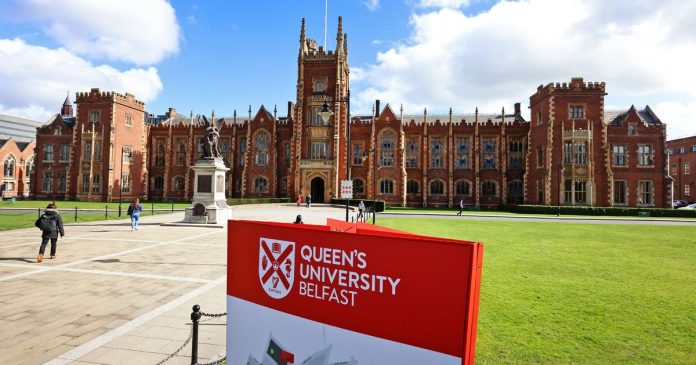After a fierce battle for language equality, Queen’s University Belfast has rejected calls for Irish language signs to be instated on campus. But the fight isn’t over yet. Its leading Irish language society has blasted the decision, with claims that the university is infringing upon students’ language rights in a way that is “not inclusive and equal” – and they’re promising to keep up the campaign.
Last week, about a hundred students gathered outside Queen’s University campus to demand physical language signs to be instated in the university, in a protest led by An Cumman Gaelach – one of Queen University’s longest running Irish societies. The group claimed that they had backing from over 1000 students and teachers. However, following a meeting earlier this week, the university stated that it would rather spend its resources on “driving student success”.
A spokesperson for Queen’s University said that they instead wanted investments to go to toward encouraging student’s achievements, as well as driving “engagement and the student experience.” They added: “If I’ve got a bit of money I’ll be putting it in that direction as opposed to signage.”
An Cumann Gaelach expressed they were “extremely frustrated and disappointed with the decision.” They argue that the university’s rejection of Irish language signs on campus is an infringement upon the student experience for Irish language speakers as well as their rights.
A spokesperson for the group said: “The attitudes displayed by the University in regards to the Irish language, and their refusal to recognise the language on equal terms with English as the indigenous language of this state, is not inclusive and equal, according to international and local law.“
According to Northern Ireland’s Language and Identity Act 2022, public authorities such as Queen’s University have a duty to uphold and protect the Irish language. This was the same year that Irish was made an official language in the country. A 2021 census found that over 228,000 people aged over three in the country spoke Irish to some degree.
The Northern Ireland government has also been urged to give the Irish language more protection by bodies such as the UN, who criticised them for their failure to appoint language commissioners for Irish and Ulster Scots earlier this year. In 2024, the European Charter for the Protection Of Regional and Minority Languages also called on the UK to adopt strategies to protect minority languages like Irish and Ulster Scots – including measures such as strengthening the teaching of minority languages.
The language has a fraught history on the Queen’s University campus, too. It stems back to 1997, when Irish language signs were removed from campus following a period of sectarian violence.
In 2018, An Cumann Gaelach’s call for signs to be written in Irish was also shot down. Seven years on, and their campaign has been met with similar pushback.
More recently, protesters received backlash from the university’s Young Unionists group, who claimed that the language made unionists feel “uneasy”. They argued that to introduce the dual language signs would prevent the university from being “a neutral and shared space.”
However, An Cumann Gaelach have clearly stated their refusal to back down. They expressed their continued support for digital multilingual signage on campus, which they say will “help create a more welcoming and inclusive campus for our international students.”
They added: “We will not give in on our demands, and we are happy to announce that we will be returning to the campaign trail, until QUB are happy to fulfil their duties. We encourage QUB management to organise another meeting with us as soon as they are willing to do so.”
At Reach and across our entities we and our partners use information collected through cookies and other identifiers from your device to improve experience on our site, analyse how it is used and to show personalised advertising. You can opt out of the sale or sharing of your data, at any time clicking the “Do Not Sell or Share my Data” button at the bottom of the webpage. Please note that your preferences are browser specific. Use of our website and any of our services represents your acceptance of the use of cookies and consent to the practices described in our Privacy Notice and Cookie Notice.


